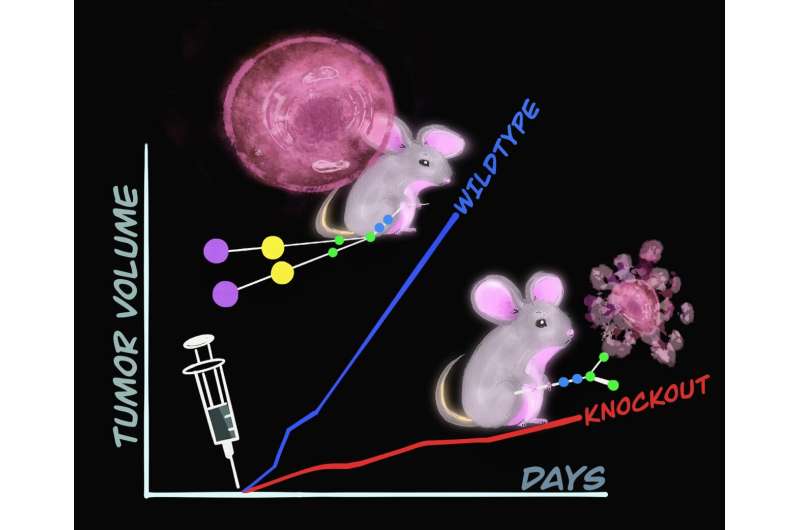This article has been reviewed according to Science X's editorial process and policies. Editors have highlighted the following attributes while ensuring the content's credibility:
fact-checked
peer-reviewed publication
trusted source
proofread
Researchers study the functions of B4GALT3 in cancer immunity

An old campaign slogan for cough syrup, "It tastes awful. And it works," seemed to imply that any sweet content might have diminished the medicinal effect.
Sweetness, in the case of cancer, appears as a chain of sugar molecules attached to proteins by beta1,4-galactosyltransferase-3, or B4GALT3. According to the Cancer Genome Atlas, a high expression of this enzyme is associated with noticeably shortened survival rates in several types of immunotherapy cancers, such as neuroblastoma, cervical, and bladder cancer. However, the specific role of B4GALT3 in the tumor immune microenvironment—or TIME—was still unknown.
Now, a team of researchers at Kyoto University and Yokohama City University has found that B4GALT3 deficiency in mice TIME inhibits tumor growth. The study shows that a significant reduction of glycosylation—a type of protein modification—on T cell surfaces correlates with increases in CD8+ immune cells infiltrating tumors.
The paper, "Beta-1,4-galactosyltransferase-3 deficiency suppresses the growth of. immunogenic tumors in mice," appeared in Frontiers in Immunology.
"In B4GALT3 knockout or KO mice, we demonstrated the potential of manipulating glycosylation of the T cell surface as a new approach to cancer immunotherapy," says Heng Wei of Kyoto University's Graduate School of Medicine.
By purifying membrane proteins and enzymatically cleaving them to enrich glycopeptides, the team could identify the sites and structures of glycans—complex and highly branched sugar chains—and the amount of glycoproteins. The role of glycans has attracted much attention in studies on cancer cells, which proliferate and metastasize, depending on their interaction with their microenvironment.
The team subcutaneously transplanted weakly immunogenic and strongly immunogenic tumor cells into B4GALT3 knockout and wild-type mice, to examine for tumor cell growth. Only the knockout mice suppressed the growth of strongly immunogenic tumor cells.
In addition, the increased CD8+ T cells in knockout mice secreted anti-cancer compounds interferon-γ and granzyme B.
"We found that the loss of B4GALT3 caused significant fluctuations in gene expression in the immune system, a discovery which has significantly changed the direction of our next phase of research," adds co-author Chie Naruse.
"We have gained insight into the role of glycans in cancer progression and immune response, inspiring possibilities of B4GALT3-centered cancer therapies," says team leader Masahide Asano.
More information: Heng Wei et al, Beta-1,4-galactosyltransferase-3 deficiency suppresses the growth of immunogenic tumors in mice, Frontiers in Immunology (2023). DOI: 10.3389/fimmu.2023.1272537



















